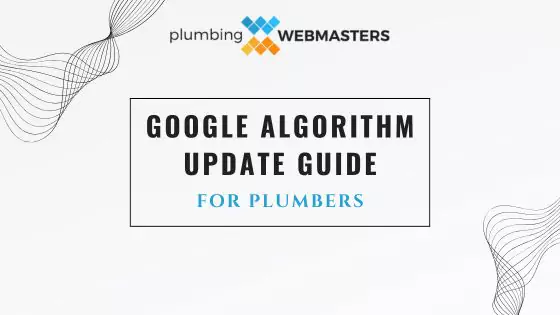Google makes algorithmic changes 12 times per day, on average, making its algorithm the most advanced in the history of civilization.
Keeping up with algorithm changes is impossible for humans, as some are so minuscule that you won’t even notice.
That said, some algorithm updates produce major changes to SERPs, including for plumbing companies like yours.
You can check out a list of major algorithm updates from MOZ and keep your eyes open for changes in your rankings, impressions, and traffic.

Major Google Algorithm Updates for Plumbers
- Google Panda Update
- Google Penguin Update
- Mobilegeddon Update
- RankBrain Update
- Medic Update
- BERT Update
- 2020 Broad Core Update
- Page Experience Update
- Helpful Content Update
What are Google Algorithms?
Google Algorithms are finite sequences of computer-implementable rules that perform a computation, producing legible search results for submitted queries.
If that sounds confusing, it’s because it is. The average person does not understand algorithms, nor do most experts.
Machine learning has taken over aspects of Google’s algorithm, meaning robots ultimately determine whether your plumbing website will rank on search results and whether it should rank in the future.
Of course, Google engineers steer the algorithm to prevent things like spam and misinformation. Ultimately, however, the goal is to deliver optimal results to its users.
Let’s review some of the most infamous algorithm updates over the years:
Google Panda Update
What started as a way for Google to find content farms that produced lackluster content has become an essential Google algorithm.
This algorithm, implemented in 2011, cracked down on low-quality, scraped, or otherwise poor content.
To avoid having Google Panda negatively affect your plumbing company website, developing original, high-quality content that provides information to your target audience is important.
At Plumbing Webmasters, we ensure that our professional content writers create content that provides solutions to your search queries, is unique, and is well-written to avoid penalties from Google Panda.
Panda Summary
- Targeted Low-Quality Content
- Targeted Thin, Manipulative Content
- Targeted “Content Farms”
Google Penguin Update
On the heels of the Panda update, Google released the Penguin Update. This update was implemented to reduce black-hat SEO practices like keyword stuffing and link-scheming, which previously shot users to the top of SERPs.
The Penguin update penalized users of these practices and rewarded original, quality content with a higher ranking.
Although the Penguin update began in 2012, at least ten updates have been made to the original structure. It was finally added to Google’s core algorithm in 2017.
Penguin Summary
- Targeted Link Schemes
- Targeted Manipulative Anchor Text
- Targeted Websites With Unnatural Backlinks
Google Hummingbird Update
In August 2013, Google came out with Google Hummingbird, one of the most prevalent Google updates ever. This update focused on user experience and giving consumers the desired results.
Google Hummingbird can do this by providing the best results based on what keywords and long-tail keywords a consumer might use.
Because this Google Algorithm wants to offer quality content for specific searches, Hummingbird won’t just target home pages of websites but try to send users to pages within a website, as well.
Hummingbird’s implications benefit online marketing and SEO firms that take the time to produce quality content for their clients.
Hummingbird Summary
- Targeted Bad User Experience
- Implemented Semantic Search and Neural Matching
- Integrated The Google “Knowledge Graph”
Mobilegeddon Update
In 2015, Google implemented an update that changed the way mobile searches worked. Google’s algorithm update dubbed “Mobilegeddon” was released to ensure that Google searchers were presented with user-friendly search results when searching from a mobile device.
However, this meant bad news for websites that were not mobile-friendly, causing them to fall drastically in SERPs.
Ensuring your site is mobile-friendly can help prevent Google penalties on your plumbing site.
Mobilegeddon Summary
- Targeted Non-Mobile-Friendly Websites
- Increased Search Rankings for Mobile-Friendly Sites
- Focused on Mobile User Experience
Rankbrain Update
Google introduced RankBrain in 2015 as a machine-learning mechanism within Google’s algorithm. The update revolutionized how Google interpreted search queries and their implicit context.
Before this update, Google and other search engines struggled to process ambiguous queries adequately, which resulted in sometimes questionable results for users.
RankBrain made Google search an overwhelmingly positive and informative experience by prioritizing relevant and useful results that matched user intent and natural language processing (NLP).
Rankbrain Update Summary
- Revolutionized Search Query Interpretation
- Introduced Machine Learning
- Increased User Satisfaction
Medic Update
Google’s 2018 Medic Update targeted websites in the health and finance industries, increasing the standards for content potentially impacting users’ money or life, phrased as your money, your life (YMYL).
This update included Google’s initial emphasis of E-E-A-T, at that point known as E-A-T (first introduced in 2014), to frame expertise, authority, and trustworthiness as essential elements of website content.
The Medic Update prevented content published by individuals without genuine expertise or credentials from ranking prominently on search results for YMYL-related queries.
Medic Update Summary
- Raised Content Standards for YMYL
- Emphasized E-A-T
- Increased Content Standards
Google BERT Update
Google announced its Bidirectional Encoder Representations from Transformers (BERT) algorithm update in October 2019, a new evolution of its natural language processing (NLP) capabilities.
BERT builds on and compliments the Rankbrain Update by continuing its nuanced understanding of language context in words, sentences, and conversational text.
These advancements allowed Google search results to deliver results that more precisely matched the user’s intent, particularly for long-tail queries.
BERT Update Summary
- Increased Nuanced Understanding of Search Queries
- Advanced User Intent Concepts
- Delivered Superior Results for Long-Tail Queries
2020 Broad Core Update
Released early in January 2021, experts noticed fluctuations in SERP results and website ranking.
When asked about the update, Google representatives responded that it is a core update meant to deliver better search results.
With that in mind, proactive marketers are honing in on content quality and link-building to ensure SERP ranking stays high.
The algorithm presumably cracked down on doorway pages, thin content, and misleading title tags.
2020 Broad Core Update Summary
- Targeted User Intent
- Enhanced Quality of Search Results Based on Intent
- Downgraded Misleading Title Tags and Doorway Pages
Page Experience Update
Google’s page experience update targets website performance and user experience.
With increasing baseline expectations for website speed, navigation, and similar items, Google increased the threshold for websites, specifically on mobile.
As more users surf the web through smartphones, websites failing to produce navigable mobile websites will lose ranking accordingly.
The update also addresses websites with poor Core Web Vitals, which discourage a positive user experience.
Page Experience Update Summary
- Targeted Website Performance and UX
- Raised Standards on Site Speed and Other UX
- Introduced Core Web Vitals
Helpful Content Update
August 2022’s Helpful Content Update was one of the most significant algorithm changes in years. The update targets thin and low-quality content that fails to provide value to the user.
Furthermore, the update foreshadowed the subsequent emergence of AI-generated content and ChatGPT.
Plumbing websites were one of the most impacted verticals in this update because many plumbing company sites featured hundreds and even thousands of blog posts on their websites.
While blog posts were once considered an effective SEO strategy, most fail to provide value to website visitors.
As a result, plumbing websites that regularly published thin blog posts were hit by the Helpful Content Update.
At Plumbing Webmasters, we can help you fix your content by reducing the number of blog posts and replacing them with high-quality pins from DataPins.
Helpful Content Update Summary
- Targeted Unhelpful Content
- Foreshadowed AI Content Generation
- Increased Value of User-First Web Content
Check Back for Future Algorithm Updates
Google regularly updates its algorithm; some updates are more significant than others. We will post the updates here when Google releases major updates that impact plumbing companies and their websites.
At Plumbing Webmasters, we are committed to helping your company thrive on Google search results.






